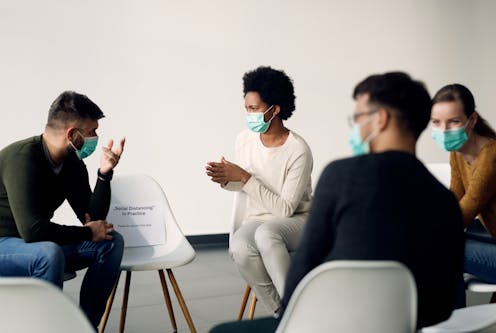
Community-engaged research involves the active and meaningful involvement of people directly affected by a research problem. Like most activities that require personal interaction, this type of research was disrupted by the restrictions of the COVID-19 pandemic.
This research approach is intended to build trustworthy relationships and yield mutual benefits. Community-engaged projects have garnered attention over the past two decades as they focus on tackling inequities, which often arise during public health crises.
Conducting community-engaged research has several benefits, like increasing the relevancy of studies, incorporating lived experience, and supporting the sharing of findings back to affected communities. Community engagement also plays an important role in emergency responses. Community-engaged emergency responses can promote the uptake of public health interventions and bolster advocacy efforts.
Table of Contents
Community-engaged research during the pandemic
Researchers’ ability to engage with communities was impacted by the COVID-19 pandemic. Public health measures focused on preventing the spread of COVID-19 (such as limits on in-person gatherings) halted traditional forms of fieldwork. For example, researchers could not safely host in-person interviews. They were forced to quickly adapt to unfamiliar virtual teaching and learning platforms.
At the same time, civil society organizations (CSOs), non-profit agencies operating separately from government and business, were stretched thin as their demand soared. These organizations are sought after as community research partners since they are embedded in the communities they serve and provide crucial services to community members. Examples include the United Way BC and Sources Community Resource Centre, which provide direct services, support and relief to communities across B.C.
In 2023, the Pacific Institute on Pathogens, Pandemics, and Society (PIPPS) hosted a roundtable with community-engaged researchers at Simon Fraser University to learn about their experiences engaging with communities amid the pandemic. Findings from our roundtable, supplementing this article, have also been included in our Community-Engaged Research during Health Crises: Engaging with Civil Society Organizations handbook published by PIPPS and SFU Community Engaged Research Initiative.
Barriers to conducting community-engaged research
Roundtable attendees first discussed the challenges of conducting research remotely, with one noting how their research plans were put on pause for more than three months because of pandemic-related restrictions. Attendees also highlighted how managing multiple forms of online communication disrupted their work-life balance.
Several attendees found it difficult to recruit research participants; they discussed the challenges of the digital divide, referring to the gap between communities’ access to information and communication technologies.
Researchers faced challenges with ethics review boards, which did not consider the risks and unique considerations of engaging communities in a public health crisis. While ethics applications were expedited, researchers felt they lacked guidance for community-engaged research during the pandemic.
Researchers also found it hard to maintain relationships with communities amidst the pandemic. Some key ways researchers connect with communities are through sharing findings and hosting food-sharing events, such as lunch and learns. These opportunities were not available during the pandemic. In addition, many of their long-standing relationships with CSOs were strained as they experienced layoffs and increased demand. Researchers did not want to impede on CSOs’ frontline pandemic-related efforts.
Opportunities emerging from the pandemic

(Shutterstock)
Despite the challenges they faced, researchers identified a range of opportunities that emerged as a result of the pandemic. They noted how they could increase the scope of their projects since virtual tools, like Zoom, allowed them to reach rural and remote communities. These platforms also provided low-barrier forms of participation for participants with accommodation needs.
Researchers also discussed how the pandemic forced the “professional veneers to slip away.” Over time, researchers connected on a more vulnerable level with their community partners, as they all attempted to get through the pandemic. Collectively, they showed up in their most authentic way and practised humility in their partnerships. Moreover, research teams emphasized the importance of building community, which reinforced their commitment to mutual benefit.
Through their community-engaged work, some researchers hired people with lived experience of the research problem of interest. This opportunity emerged during the pandemic. Compensating members of the research team for their knowledge strengthened the relevancy of their findings as they directly learned how the pandemic was impacting distinct groups.
Lessons learned: Conducting community-engaged research in future crises
Participants were asked what they would do differently in future health crises. Some discussed the significance of holding informal check-ins with their teams to openly discuss professional and personal challenges. Others pointed to the need for knowledge and resource sharing with other community-engaged researchers, to break down silos.
Additionally, attendees underscored the benefits of interdisciplinary research teams, bringing together diverse skills and expertise. In health crises, they aim to work collaboratively with academics and service providers from CSOs.

(Shutterstock)
Based on the key themes of the roundtable, three recommendations emerged to support community-engaged research in future public health crises:
1) Post-secondary institutions should develop guidance for community-engaged research in health emergencies
Since post-secondary institutions increasingly recognize the importance of community-university partnerships, institutions should create protocols to support community-engaged research in public health crises. Attention should be paid to crisis-related considerations, including funding sources, resource challenges and ethics.
2) Develop targeted funding opportunities for community-engaged research partnerships
During the pandemic, research unrelated to COVID-19 faced funding drawbacks and resource constraints. This may have secondary effects in the “post-pandemic era,”
especially for projects addressing health inequities. To avoid these unintended consequences, partnerships should be proactively supported by post-secondary institutions and funding agencies, to provide research partners with honoraria for their time and insights shared, and to help academic researchers build networks for engagement.
3) Prioritize capacity-building in partnerships
Mutual benefit is a guiding principle of community-engaged research. In partnerships, academic researchers often benefit through career advancement and a sense of fulfillment. Yet, community partners are not always assured the same benefits. To ensure mutual benefit, capacity building, referring to the process of building skills, abilities and resources, should guide community-engaged research partnerships. Both academic researchers and community partners bring significant assets to projects; these assets and training gaps should be uncovered at the outset of projects and considered throughout the partnership.
In addition to these recommendations, a repeated theme for participants was how community-engaged research should be viewed as a fundamental component of their work, as opposed to an afterthought. Rather than treating community-engaged research as a “peripheral activity,” the principles of community engagement should be embedded in research, teaching and learning.
![]()
Julia Smith receives funding from the Canadian Institutes of Health Research and Health Research BC.
Simran Purewal does not work for, consult, own shares in or receive funding from any company or organisation that would benefit from this article, and has disclosed no relevant affiliations beyond their academic appointment.























